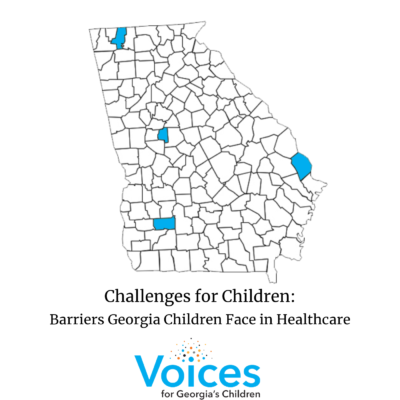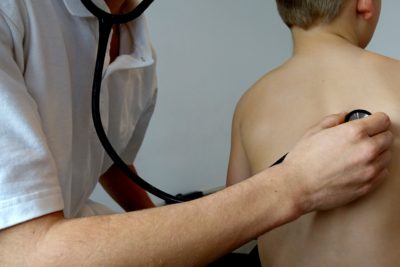More than 80 percent of uninsured Georgia children were eligible for coverage in government health insurance programs in 2016, but were not enrolled, a new report says.
Several barriers to enrollment and medical services can prevent kids from getting the care they need, said the report, from the advocacy group Voices for Georgia’s Children.
The report said an estimated 140,000 of the 162,000 Georgia kids uninsured two years ago could have been enrolled in either Medicaid or PeachCare. The latter program is designed for children without coverage whose parents have incomes higher than that for Medicaid eligibility.

Voices for Georgia’s Children conducted focus groups in four geographically diverse counties of the state, asking residents about problems in accessing care for children. They were Whitfield, in northwest Georgia; Dougherty, in the southwest; Effingham, in the east; and Lamar, in Middle Georgia.
“We wanted to have the input of the communities themselves,’’ said Erica Fener Sitkoff, executive director of Voices for Georgia’s Children, which is producing podcasts on the sessions.
Based on these conversations, Voices listed 10 common hurdles to medical care for kids.
One problem listed is a complicated process of establishing eligibility and enrolling children in government programs. Enrollment in Medicaid and PeachCare “is a particular challenge in Georgia,’’ Fener Sitkoff said Monday.
“It’s a cumbersome system,’’ she said. “It’s challenging [even] for people who are very well versed in health literacy.”
In rural areas, Fener Sitkoff added, “on-the-ground outreach is harder to do.’’
She recommends streamlining and improving the enrollment process.
Other recommendations include incentivizing pediatricians and other specialists to make regular visits to areas where services are lacking; better Internet access in rural areas; establishing more school-based health clinics; and ensuring access to health coverage for parents and adults caring for and/or living with children.
More than 60 of Georgia’s 159 counties have no pediatrician.
The report also calls for additional support for telehealth, and continued investment in mental health services for children. Fener Sitkoff commended Gov. Nathan Deal’s push for more spending on mental health care services for kids. “I think it has started to make a difference,” she said.

For both children and adults, access to health insurance and adequate care varies throughout Georgia, said Bill Custer, a health insurance expert at Georgia State University.
The Children’s Health Insurance Program, known as PeachCare in the state, has greatly reduced the number of uninsured children since being created in the 1990s, Custer said. And the Affordable Care Act led many parents to realize their children were eligible for the public programs, he said.
“A lot of families may choose not to enroll [a child] until they have a sick child,’’ Custer said. Continuous coverage and access to preventive care are very important for kids, Custer said. When adults lose insurance, it puts their children’s coverage at risk, he added.
The report said poverty is among the most difficult problems that keep people from getting care. About 23 percent of Georgia kids live in poverty. Many families lack transportation and stable housing.
The report also mentions the possible stigma associated with using public programs.
One Lamar County participant, according to the report, said, “Sometimes I think that’s the stigma of what people are thinking, they’re looking down on me because I come in here applying for some food stamps or some Medicaid or some services. They may feel like the person on the other side of the desk is giving them a hard time.”
About 53,000 parents earn too much for Medicaid or CHIP but not enough to afford health insurance, the report said.
“So how do we better serve the underserved in our community, that’s not necessarily in poverty, but their income meets the level where they can’t afford it,” said a Dougherty County speaker.

A speaker in Effingham County referred to enrolled patients’ problem of finding a doctor who will take them: “We got approved for Medicaid. I got the packet in the mail [and] called every doctor that was listed for our area. Nobody was accepting new Medicaid patients.’’

